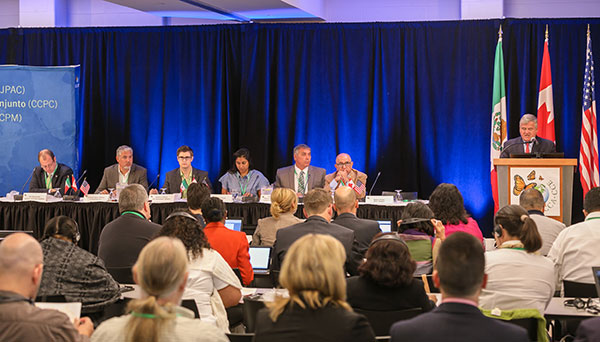General public to join North America’s top environmental officials this June to discuss Harnessing Local Innovation for a Healthy Future
Canadian Environment and Climate Change Minister Catherine McKenna will host her Mexican and United States counterparts to discuss innovation and trilateral environmental cooperation
Montreal, 4 May 2017—On June 27 and 28, the Commission for Environmental Cooperation (CEC) invites the general public to join the annual gathering of its governing body, the Council of the federal environment ministers of Canada, Mexico, and the United States. This year, Canadian Environment and Climate Change Minister Catherine McKenna will host Mexico’s Secretary of Environment and Natural Resources Rafael Pacchiano Alamán and US Environmental Protection Agency Administrator Scott Pruitt. To mark Canada’s 150th anniversary, the 2017 CEC Council Session will take place in the birthplace of Canadian Confederation: Charlottetown, Prince Edward Island.
The public is encouraged to participate in the following events:
- Let’s Talk Innovation, an engagement with the registered participants on “Innovation for clean growth in North America” on the afternoon of June 28
- Connecting Communities for a #HealthyFuture: An Interactive Exhibit will give the public the opportunity to learn more about the Commission’s work to protect and enhance North America’s environment. The public can experience a blue carbon virtual reality tour, try out a citizen science application developed by North America’s largest tribal health organization and learn more about the continental flyway of the monarch butterfly and how to protect it.
- A one-day public forum of the CEC Joint Public Advisory Committee (JPAC) will be held prior to the Council Session, on June 27, in which North American coastal, shoreline, and riverbank communities share their innovative local solutions to the environmental challenges they face. North Americans can join this session via live broadcast and send in their questions and comments on social media.
Register today!
Participation at the 2017 CEC Council Session and Joint Public Advisory Committee forum is open to the public and free of charge. Space is limited and all participants must register online in advance and there will be no on site registrations.
Simultaneous translation to English, French and Spanish is available for in person and online participants.
In addition, limited financial assistance is available for travel and lodging and may be requested (via the online registration form) before 31 May 2017. For more information, please contact jpac@cec.org.
Participate virtually - join the live broadcast and online discussions
If you cannot attend the Council Session and JPAC forum in person, you can participate online via webcast. Send in questions and comments on social media via our Facebook page or Twitter using the handle (@CECweb) or the hashtag #Charlottetown2017. You can also email your questions to info@cec.org.

About the CEC
The Commission for Environmental Cooperation (CEC) was established in 1994 by the governments of Canada, Mexico and the United States through the North American Agreement on Environmental Cooperation, a parallel environmental agreement to NAFTA. As of 2020, the CEC is recognized and maintained by the Environmental Cooperation Agreement, in parallel with the new Free Trade Agreement of North America. The CEC brings together a wide range of stakeholders, including the general public, Indigenous people, youth, nongovernmental organizations, academia, and the business sector, to seek solutions to protect North America’s shared environment while supporting sustainable development for the benefit of present and future generations
The CEC is governed and funded equally by the Government of Canada through Environment and Climate Change Canada, the Government of the United States of Mexico through the Secretaría de Medio Ambiente y Recursos Naturales, and the Government of the United States of America through the Environmental Protection Agency.